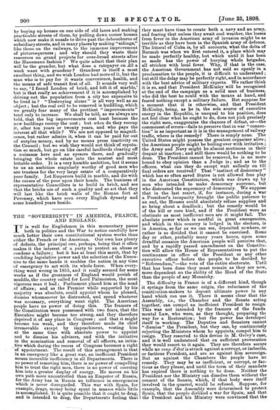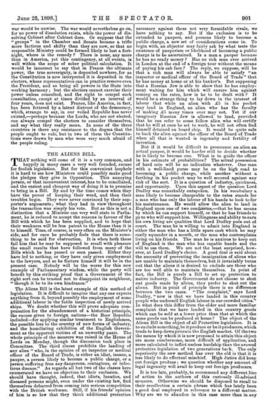THE " SOVEREIGNTY " IN AMERICA, FRANCE, AND ENGLAND.
IT is well for Englishmen in this momentary pause both in politics and the War to notice carefully how much better their own constitutional system works than either the French or the American. Our own has plenty of defects, the principal one, perhaps, being that it often makes it the interest of a party to protect an abuse or condone a failure ; but it has at least this merit, that by confiding legislative power and the selection of the Execu- tive to the same hands it enables the nation in any time of emergency to act with its whole force. When every- thing went wrong in 1855, and it really seemed for some weeks as if the greatness of England would perish of muddle, the country called for Lord Palmerston, the most vigorous man it had ; Parliament placed him at the head of affairs; and as the Premier while supported by his majority was absolute, could appoint whom he pleased, dismiss whomsoever he distrusted, and spend whatever was necessary, everything went right. The American people have no power of doing this. The framers of the Constitution were possessed with two fears, that the Executive might become too strong, and they therefore deprived it of any place in Congress ; and that it might become too weak, and they therefore made its chief irremovable except by impeachment, vesting him at the same time with absolute power to appoint and to dismiss his advisers, and with the initiative in the nomination and removal of all officers, an initia- tive which during the recess of Congress becomes a right of appointment. The result of this arrangement is that in an emergency like a great war, an inefficient President means incurable inefficiency in all Departments. There is no power of removing him, there is no power of compelling him to trust the right men, there is no power of coercing him into a greater display of energy. He moves on his own path more uncontrolled than an Emperor of Russia, for the Army has in Russia an influence in emergencies which is never disregarded. This war with Spain, for example, drags, money being spent in masses while little is accomplished. It is quite possible that it ought to drag, i and is intended to drag, the Departments feeling that they must have time to create both a navy and an army, and fearing that unless they await cool weather, the losses from fever in the American army of invasion might be as terrible as they have been in the Spanish army of defence. The littoral of Cuba is, by all accounts, what the delta of Burmah was when we first entered it, a place which may be made perfectly healthy, but which until it has been so made has the power of burying whole brigades, all stricken with local fever. Why, if that is the case, the American Government has not said so openly in a proclamation to the people, it is difficult to understand ; but still the delay may be perfectly right, and in accordance with the best advice of military experts. We rather think it is so, and that President McKinley will be recognised at the end of the campaign as a solid man of business, who did the best he could with the means at hand, and feared nothing except a military failure. But suppose for a moment that it is otherwise, and that President McKinley, being, as he is, the sole source of executive energy in the Republic, is unequal to his position, does not feel clear what he ought to do, does not pick precisely the right men, exaggerates the chances of defeat, or—the commonest of errors—fails to perceive that in war " connec- tion" is as important as it is in the management of railway traffic, where is the remedy? There is simply none. The United States might possess the greatest organiser alive; the American people might be boiling over with irritation ; the Army and Navy might be almost mutinous in their despair at inaction ; and still there would be nothing to be done. The President cannot be removed, he is no more bound to obey opinion than a Judge is ; and as to the officers, what can they do except wait sullenly on till final orders are received? That " instinct of democracy" which has so often saved States is not allowed free play in the American Constitution, which was drawn up by men who intended to make democracy supreme, but who distrusted the supremacy of democracy. We suppose that in the last resort, if, for instance, during a war a President's incapacity brought the public patience to an end, the Houses could absolutely refuse supplies and so bring about a deadlock ; but the remedy would be of the kill or cure kind, and if the President were as obstinate as most inefficient men are it might fail. The absolute power which is needful in great emergencies, and which in this country is lodged in the electors, is in America, so far as we can see, deposited nowhere, or rather is so divided that it cannot be exercised. Some day or other, probably many years hence, upon some dreadful occasion the American people will perceive that, and by a rapidly passed amendment on the Constitu- tion will allow the House of Representatives to put the continuance in office of the President or any other executive officer before the people to be decided by " Referendum,"—the vote of the entire electorate. Until that has been done they must remain as they are now, more dependent on the ability of the Head of the State than the people of any Monarchy.
The difficulty in France is of a different kind, though it springs from the same origin, the reluctance of the constitution-makers to deposit ultimate power in any hand which can use it. There it seems clear that the Assembly, i.e., the Chamber and the Senate acting together, can compel an inefficient President to resign. This was not intended by the framers of the funda mental Law, who were, as they thought, preparing the way for a Restoration ; but the power has developed itself in working. The Deputies and Senators cannot " dismiss " the President, but they can, by continuously rejecting the Ministers whom he appoints, compel him to resign. They resorted to this device in M. Gravy's case, and it is well understood that on sufficient provocation they would resort to it again. They are therefore secure while no coup d'e'tat is struck against a corrupt, or imbecile, or factious President, and are as against him sovereign. But as against the Chambers the people have no remedy. They may be as inefficient, or corrupt, or fac- tious as they please, and until the term of their mandate has expired there is nothing to be done. Neither the President nor the Ministry can dissolve them without the consent of the Senate, which, if that body were itself involved in the quarrel, would be refused. Suppose, for example, that the Assembly were determined to protect Spain, that the people disliked a war for Spain, and that the President and his Ministry were convinced that the war would be unwise. The war would nevertheless go on, for no power of dissolution exists, while the power of dis- solving Cabinet after Cabinet does. Or suppose that the " groups " in the Chamber and Senate became a trifle more factious and shifty than they are now, so that no responsible Ministry could be formed likely to last a fort- night, where is the remedy ? There is none, any more than in America, yet this contingency, at all events, is well within the scope of sober political calculation. It would be incorrect to say that in France the ultimate power, the true sovereignty, is deposited nowhere, for as the Constitution is now interpreted it is deposited in the electors, whose representatives can in practice remove even the President, and so bring all powers in the State into working harmony ; but the electors cannot exercise their power unless consulted, and the right to compel such consultation, except at times divided by an interval of four years, does not exist. France, like America, in fact, has been fettered by a latent distrust of the democracy, which, strange to say, in our veiled Republic has never existed,—perhaps because the Lords, who are not elected, can always compel the electors to consider themselves, and say what they really mean. In none of the three countries is there any resistance to the dogma that the people ought to rule, but in two of them the Constitu- tions were drawn by men who were very much afraid of the people ruling.



















































 Previous page
Previous page